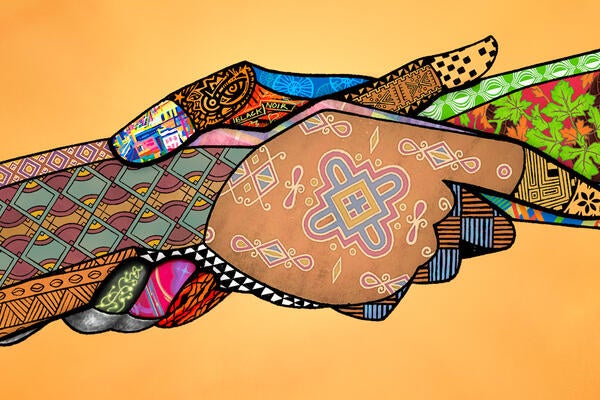
Connecting through games
The Games Institute hosts its first virtual GI Game Jam

The Games Institute hosts its first virtual GI Game Jam
By Marisa Benjamin The Games InstituteFor the students at the Games Institute (GI), cancelling Waterloo’s termly GI Game Jam was never an option.
“Our event attracts nearly 300 people across the world annually. We haven’t missed a term since 2014, and we weren’t going to allow COVID-19 to get in the way of that, even if it means coming together virtually,” Cayley MacArthur says, a Systems Design Engineering PhD student and long-time organizer of GI Game Jam. “Our attendees need a social outlet now more than ever, and we weren’t going to let them down.”
The perseverance in honour of GI Game Jam’s community inspired this year’s theme of “Connection,” a concept that’s tied into each participant’s project.
Spanning four days, 95 registered participants ranging from ages 10 to 50 from around the world created 25 new games. The event is an opportunity for anyone at any game development level to flex their creative muscle in a community of playful and professional gaming enthusiasts. It also helps students find jobs in game development and provides a platform for researchers working with games.
"For the club, it’s important to have events to keep people engaged during this time. And for me, the GI Game Jam is my chance to work on a for-fun side project with other people,” Andrew Beach says, game development club executive member. “I’m happy to continue with virtual jams until physical jams are an option. Though I must say, I am looking forward to the day we can be in person again."
Typically, the GI Game Jam takes place once per term, in-person, on Waterloo’s campus. However, due to COVID-19, the Jam could not follow its usual format, so organizers had to find another way for participants to collaborate, network, attend talks and ceremonies and interact with mentors all virtually.
Volunteer organizers built an online infrastructure through Discord with public and private channels so participants can form teams and interact using the built-in audio, video and streaming functions. The virtual atmosphere removed barriers between jammers, too, as teams were able to provide support for one another online and offer live stream tutorials.
“This jam brought together people who would've never been able to attend a jam before, whether due to money, distance, or time,” MacArthur says. “Now, a ninth-grader can join from the safety and comfort of their own home. A father/daughter team can participate from theirs, on a schedule that suits them.”
“One of our biggest challenges was figuring out how to sustain interest and engagement for four consecutive days, all while dealing with inevitable technical difficulties,” Marvin Pafla says, lead organizer of the Spring 2020 Game Jam and Systems Design Engineering Master’s student. “I’m really grateful and proud of our team of volunteers. This wouldn’t have been possible without them”.
While the format of future GI Game Jam gatherings remains unclear, the current environment has encouraged organizers to practice what they preach by offering new, innovative ways to stay connected. It’s even allowed for the expansion of their mentorship system. Each team was paired with a dedicated volunteer who worked with them one-on-one throughout the entire weekend, encouraging ongoing engagement and inclusion.
“We wanted to inspire people to be creative and optimistic about what it means to connect,” Joseph Tu says, a master’s student from Systems Design Engineering. “Sure, we’re all separated by physical distance, but, in a way, this Jam connected people more than ever as we saw an unprecedented diversity in age and education among participants, with some joining us from as far away as South Korea and Bulgaria. We count this as a success and look forward to making this event available to even more students in the future.”

Read more
Upside Robotics secures new funding to accelerate the future of sustainable farming

Read more
Discover the meticulous work that uncovered Black stories on campus and preserved them for the future

Read more
A message from the President and Vice-Chancellor
The University of Waterloo acknowledges that much of our work takes place on the traditional territory of the Neutral, Anishinaabeg, and Haudenosaunee peoples. Our main campus is situated on the Haldimand Tract, the land granted to the Six Nations that includes six miles on each side of the Grand River. Our active work toward reconciliation takes place across our campuses through research, learning, teaching, and community building, and is co-ordinated within the Office of Indigenous Relations.